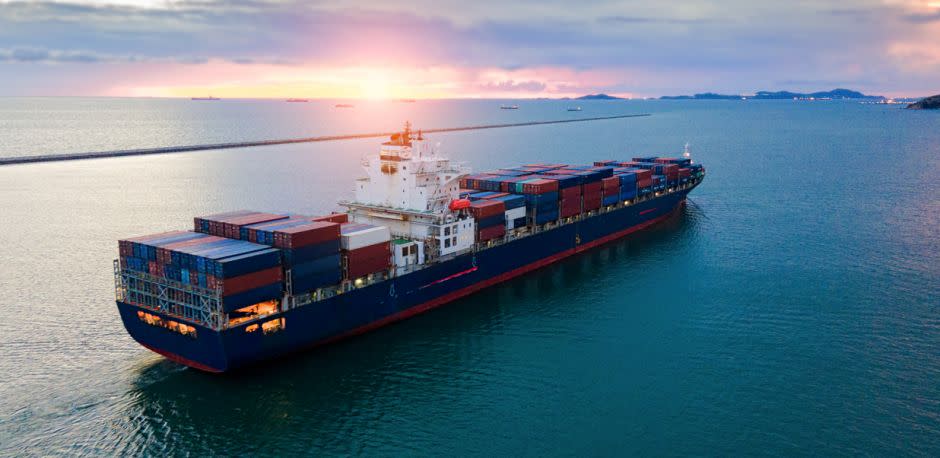Industry veteran Bruce Stout will be retiring in June 2024, with longstanding colleagues Samantha Fitzpatrick and Martin Connaghan replacing him as co-managers of the trust.
The trust invests in both bonds and equities (company shares)
A well-resourced team with analyst coverage in all corners of the market
How it fits in a portfolio
Murray International Trust aims to grow income and capital over the long term by investing in company shares from around the globe, as well as some bonds. The managers invest more in higher-risk emerging markets compared to the benchmark, so the trust could provide useful diversification to an investment portfolio investing in more traditional income hunting grounds such as the UK. Investors in closed-ended funds should be aware the trust can trade at a discount or premium to Net Asset Value (NAV).
Manager
Bruce Stout is an industry veteran and had been involved with the trust since 1992 before becoming lead manager in 2004. He is set to retire from abrdn and step down as the trust’s manager in June 2024. Longstanding colleagues Samantha Fitzpatrick and Martin Connaghan will take over the running of the trust once Stout leaves. They were appointed co-managers at the end of 2019.
Fitzpatrick and Connaghan both have over 25 years of industry experience and worked for Murray Johnstone which was acquired by abrdn in 2001. Fitzpatrick originally started on the performance and risk team before getting more involved with the trust. Connaghan has held a number of roles including trader and ESG (Environmental, Social and Governance) analyst. They also have plenty of resources at their disposal including a large team of analysts with eyes in all corners of the market.
Process
The team invests in high-quality, financially robust companies that they believe have the potential to grow earnings and dividends over the long term. There’s an emphasis on companies with resilient business models, a unique set of advantages over the competition and experienced management teams.
To identify opportunities, they use research from across the firm’s regional teams. This helps the managers whittle down a universe of around 13,000 companies to a final portfolio of between 40-70 names. The managers don’t have a yield (income) target for the companies they invest in. Instead, they blend companies with higher yields, and those with lower yields but more potential for income growth.
Historically, investors seeking income focused on the UK, but the team has found more opportunities overseas over the years and as of the end of March 2024 just 3.8% of the trust was invested in UK shares. European shares are the largest allocation, accounting for 27.3% of the trust. The managers think companies here tend to be less constrained by debt, leaving them in a better position to pay dividends, while also reinvesting in the business for future growth. There’s also a sizeable investment in Latin America and other emerging markets. The managers believe valuations in this part of the world remain attractive.
The managers also invest part of the trust in bonds. At the end of March 2024 they accounted for 6.2% and are mainly from Asian and emerging markets. They only buy bonds they believe are available at a discount to their true worth, and occasionally sell them to use the cash to buy shares.
During 2023 the team added a few companies to the trust. They invested in alcoholic beverage companies Diageo and Pernod Ricard. The team believe that over the long-term consumers will want to drink higher quality alcoholic beverages, with Diageo focussing on the US market and Pernod Ricard focusing more on Asia. The team also invested in Asian stock market Hong Kong Exchanges and Mexican retailer Walmex.
To buy these new investments, the team sold a number of companies. Swedish bank Nordea was sold after the team became concerned it may be affected by the banking crisis in the US where several regional banks collapsed. They also sold UK telecommunication company Vodafone where, despite providing a good dividend, the growth of the company had stalled.
The managers can use gearing (borrowing to invest), which can boost gains but also increases losses so it’s a higher-risk approach. At the end of December 2023 gearing stood at 8%. This is marginally lower than the previous year when gearing stood at 11% and was reduced because borrowing became more expensive as interest rates rose.
They can also use derivatives to help them invest, which if used, increases risk too. The investment trust structure gives them the flexibility to also invest in higher-risk unlisted companies, but this is not currently used.
Culture
The trust is managed by abrdn, which was created with the merger of Aberdeen Asset Management and Standard Life plc in 2017. Mergers have the potential to cause disruption, though this one provided the managers with access to a bigger pool of resources.
Stout took over as sole manager of this trust in 2004 but has been part of the global equities team for many years and has demonstrated dedication to this trust and its long-term investment strategy. He’s worked with co-managers Fitzpatrick and Connaghan for over 20 years who will be taking over from Stout in June 2024 – they work collegiately and welcome the support of the group’s analysts based all over the world.
ESG integration
abrdn is a firm well known for its commitment to ESG. Responsible investing has been part of the business since it set up its Corporate Governance team in 1992 and launched its first ethical fund in 1994. We like that the firm’s policy positions on a range of divisive issues, from plastics and tobacco to palm oil and biodiversity, are easily available on their website. The firm also produces frequent ESG-related thought leadership articles, a podcast series and an annual Stewardship report.
We’re pleased to see that the firm’s commitment to ESG has filtered down to the fund level. abrdn fund managers generally see themselves as owners of businesses, not investors, and stewardship is an important part of their investment processes. The firm exercises all voting rights and engages with management to encourage best practice.
ESG and stewardship factors are included in every stock research note and each firm receives an ESG score, based on its ESG credentials and its ability to manage ESG risks. In fixed income, ESG risks are assessed and priced alongside other credit risks, and the managers encourage action that will reduce these risks. As with equities, each issuer receives an ESG risk rating. abrdn fixed income managers can invest in bonds issued by companies with a poor ESG risk rating, but they will require greater compensation via the credit spread, and usually take a smaller position size. All managers have access to a central ESG team, as well as specialist on-desk analysts.
The company runs several exclusions-based, sustainability focus and sustainability impact funds, which take its commitment to society, the environment, and other thematic investment goals a step further.
This trust’s Board engages actively with the manager on the assessment and integration of ESG factors. While the trust integrates ESG analysis, it does not have any exclusions, which means it can invest in any sector.
Cost
The trust’s net ongoing annual charge is 0.53%, a marginal increase from last year where the ongoing annual charge was 0.52%. Investors should refer to the latest annual reports and accounts, and Key Information Document for details of the risks and charging structure. If held in a SIPP or ISA the HL platform charge of 0.45% (capped at £200 p.a. for a SIPP and £45 for an ISA) per annum also applies. The HL platform charge doesn’t apply if the trust is held in a Fund and Share Account.
Investment trusts trade like shares, both a buy and sell instruction will be subject to the HL share dealing charges.
Performance
Long-term performance under Bruce Stout has been strong. Since June 2004 the trust’s delivered returns of 649.12%* in share price terms compared with 410.9% for the AIC Global Income sector average. Since Fitzpatrick and Connaghan joined Stout as co-managers in December 2019 the trust has returned 22.77% in share price returns compared to 13.49% for the AIC Global Income sector average. The trust’s Net Asset Value (NAV) rose 41.29% over the same time. As always past performance is not a guide to the future
Due to the large differences in the trust’s geographical exposure compared with the broader global stock market, there could be times when performance will be very different to the benchmark, both positively and negatively. We’ve seen this occur since Stout has managed the trust.
Over the trust’s latest financial year, 1 January 2023 to 31 December 2023, the trust underperformed the AIC Global Income sector average. The trust delivered returns of 1.07% in share price terms compared to 9.27% for the sector. That said, the trust’s NAV rose 8.24%.
Investments in European companies contributed the most to the trust’s performance over 2023. A combination of strong growth and increasing dividends meant positive returns from Swedish Industrial company Epiroc, German technology company Siemens and Dutch semi-conductor company BE Semiconductor to name a few. Latin America was also a strong region for the team. Businesses focussing on consumers performed well, including Mexican companies Grupo Asur, Kimberly Clark de Mexico and Walmex.
On the other hand, investments in a selection of US and UK companies that didn’t perform as well. Tobacco companies British American Tobacco and Philip Morris performed poorly, as well as US healthcare company Bristol Myers Squibb and Chinese property developers China Vanke.
This trust aims to grow its dividend ahead of the rate of inflation – something it has achieved in 15 of the 19 years Stout has managed the trust. This will remain a key focus for Fitzpatrick and Connaghan.
The trust has also seen 19 years of consecutive dividend increases which means it’s among the AIC’s next generation of dividend heroes (trust’s that have increased their dividends for more than 10 years but fewer than 20). The total dividend per share for the year to 31 December 2023 was 11.5p. This is a 2.7% increase from last year. Income is not guaranteed and yields aren’t a reliable indicator of future income. The level of income paid will change over time.
At the time of writing the trust trades at a -9.41% discount to NAV. But during 2023 the trust on average traded at a marginal premium of 0.03% and over the last 10 years averaged a premium of 1.00%.
Annual percentage growth
Apr 2019 To Apr 2020 | Apr 2020 To Apr 2021 | Apr 2021 To Apr 2022 | Apr 2022 To Apr 2023 | Apr 2023 To Apr 2024 | |
|---|---|---|---|---|---|
Murray International Trust | -13.87% | 31.01% | 8.58% | 11.6% | -2.31% |
AIC Investment Trust - Global Equity Income | -10.46% | 31.62% | 0.79% | -3.19% | 6.94% |


